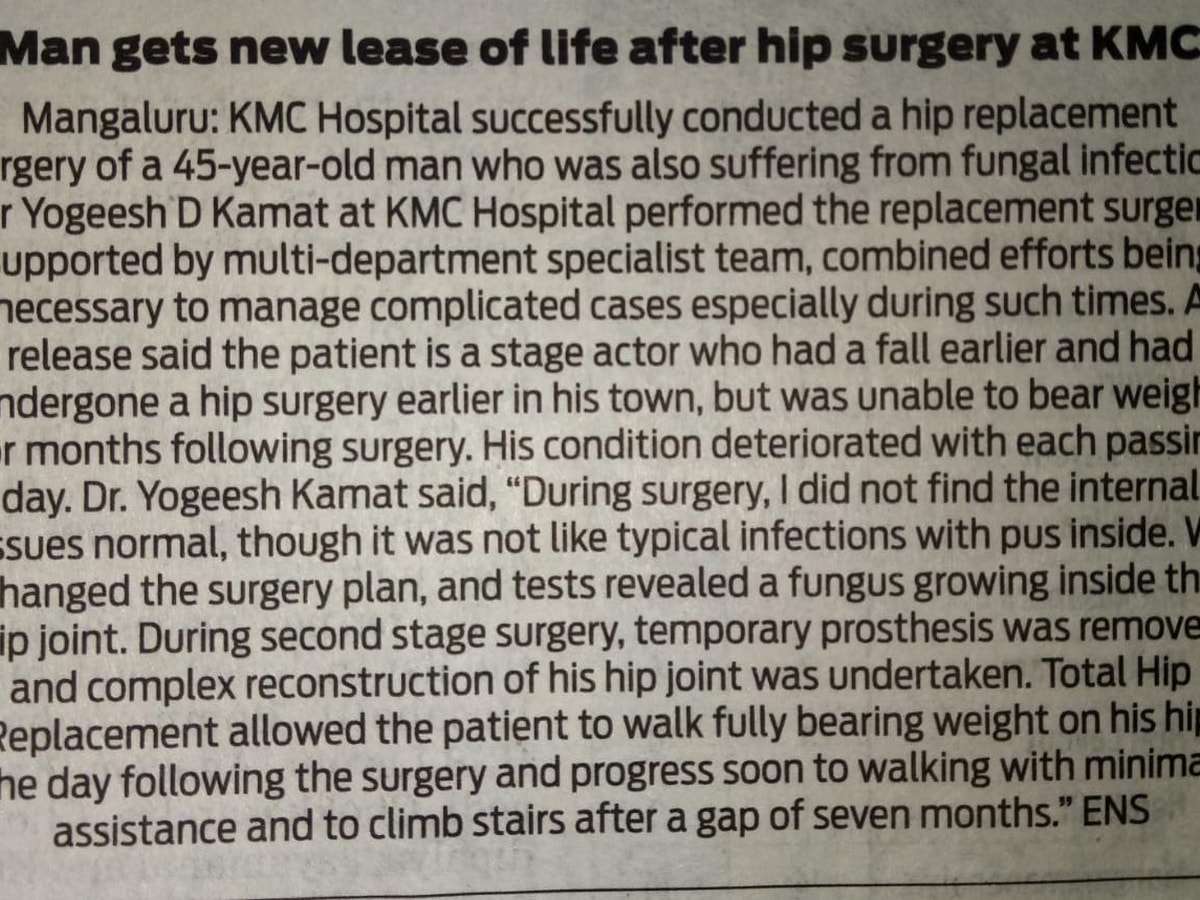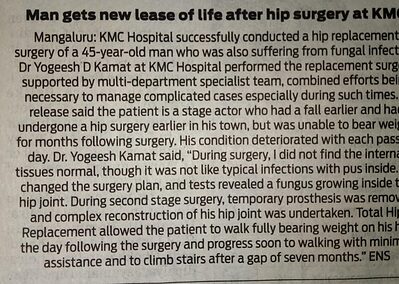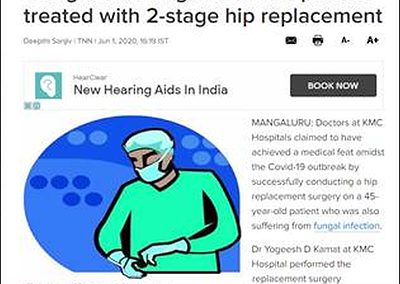Fungal infection of joints is extremely rare and few cases have been reported across the world. It is often not diagnosed as routine testing is not available. Similarly, infections are known to persist making recovery difficult. Operations on joints are susceptible to deep infection especially when they are more time consuming and when metal prosthesis are inserted. Even though cost might be cheaper in smaller establishments, the importance of highest quality controls and theatre standards that are possible in a focused specialist set up cannot be ever understated. Tackling of most complex and re-do surgery situations requires a whole team of specialist doctors to work together for the patient. Such MDT: multi- department team work (doctors as above, anaesthesia specialist Dr. Madhusudan Upadya, nurses, rehabilitation & gait training by physiotherapist Dr. Bishwaranjan Das) is the main feature of our comprehensive hip & knee care centre at KMC Hospital, which is recognized by international societies now. As we return back to undertaking work under the looming risk of the COVID pandemic, it is even more important that we take precautions while making it possible for disabled patients to return to their normal life. We reinforce our commitment to the world’s best quality standards of care.
Fungal Infection Hip treated with 2 – stage Hip Replacement amidst COVID

45 years old Manjunath from neighboring district approached Dr. Yogeesh Kamat at KMC Hospital, Jyothi, Mangaluru’s newly established ‘Comprehensive centre for Hip & Knee care’ initially in January 2020 with severe pain in his hip and inability to walk since 3 months. He is a stage actor who had a fall and subsequent surgery for a hip fracture in his small town, but still rendered unable to bear weight months following surgery. It was thought to be a case of failure due to necrosis – the hip bone loses it’s blood supply and dies sometimes after fracture and he was advised re-do surgery for the hip. During surgery, Dr. Yogeesh Kamat did not find the internal tissues looking normal, though it was not like infections with pus inside. The plan of surgery was hence changed and Dr. Kamat put an temporary prosthetic spacer which he shaped himself out of cement and added antibiotics. Tissues were sent for extensive microbiology examination which revealed a fungus growing inside the hip joint. Infectious diseases specialist Dr. Farhan Fazal was immediately consulted and an Anti- Fungal with good bony penetration was chosen as per microbe- sensitivity testing. This was given for the subsequent 6 weeks with regular blood testing. During this period, Manjunath could bear weight and walk minimally on the temporary prosthesis. His hip pain was much reduced over the weeks. The COVID lockdown started in the period when his antibiotic course was to get over. Similarly, a temporary spacer cannot be left inside for too long a period; or itself becomes a focus of infection. In this case, the patient was called back two weeks after the course of antifungal treatment was completed and fluid from the hip joint was carefully aspirated by Ultrasound scan guidance by Rheumatologist Dr. Sajjan Shenoy and after testing showed no persistence of infection. Despite the lockdown restrictions, Manjunath’s second stage surgery had to be undertaken in April 2020, when the temporary prosthesis was removed and complex reconstruction of his hip joint was undertaken. During this surgery, it was necessary to carefully test clearance of infection- fungus from the hip joint before the insertion of expensive metal prostheses. Such is possible by intra- operative sample testing in both the Pathology (emergency slide preparation by a technique called Frozen Section) and Microbiology tests for fungus, which were undertaken by Dr. Sharada Rai, Dr. Pathak (Pathologists) and Dr. Suchitra Shenoy, Dr. Archana (Microbiologists). The Total Hip Replacement allowed the patient to walk fully weight bearing on his hip the day following surgery and progress soon to walking with minimal assistance and to climb stairs after a gap of seven months. He is now doing well and plans to gradually return to his normal life.


